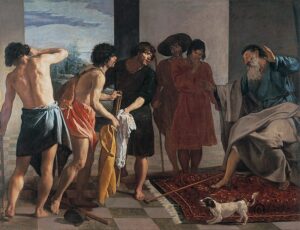Jewish learning Dangerous Gifts—the Origin of Joseph’s Amazing Technicolor Dreamcoat

Parashat Vayeshev (Genesis 37:1-40:23)
Now Israel loved Joseph more than any other of his children, because he was the son of his old age; and he had made him an ornamented tunic [ketonet passim] (Genesis 37:3 NJPS; alt. “a coat of many colors” KJV; “a long robe with sleeves” NRSV).
The following poem is a modern midrash about Jacob’s gift of the “ornamented tunic,” aka the “amazing technicolor dreamcoat” [ketonet passim] to Joseph, his favorite son. Inspired by passages from the midrash Pirqei de-Rabbi Eliezer (ch. 20 and 24), I trace Esau’s “choice (or coveted) clothing” (Gen. 27:15), worn by Jacob when he steals the blessing, back to the skin that the Primordial Serpent sloughed off, which God gave to Adam and Eve: “And the LORD God made garments of skins [kotenot ‘or] for Adam and his wife, and clothed them” (Gen. 3:21). Does this special cloak bestow the rights of the firstborn, priestly status, or perhaps a will to power upon the recipient? Though the patriarch hopes that Joseph will be worthy of the tunic, ultimately we know the consequences of this dangerous gift!

Jacob’s Gift
I stand over the pit where I had buried the coveted cloak and dig,
brush off the dirt and lift it up: sheen of snakeskin,
fragile yet not worn thin by time, embroidered with crimson thread—
torso of Behemoth, winged beasts, and tail of Leviathan.
It shimmers, weightless, a sequin gown
made of fingernails that mirror moonlight.
I wore this robe when I stood before my father:
See the smell, my son,
is like the smell of the field that Yahweh blessed.
Whiff of Eden—this is the cloak
that the Primordial Serpent sloughed off
with a cry that traveled from one end of the Earth to the other.
And God wove the snakeskin into two robes—
one for her and one for him.
All the beasts of the field crowded round,
birds of the air swooped down, sea creatures
swarmed to the waters’ edge to bask in the shimmer.
They all declared Adam and Eve king and queen of the Earth.
And Adam passed the cloaks on to Seth, and Seth to Noah,
and Noah passed them to Shem.
Adam’s cloak rests with Melchitzedek, High Priest of El Elyon.
But Eve’s cloak was passed on to Ham.
And Nimrod inherited her gown of snakeskin.
When the Mighty Warrior wore the cloak,
Esau, my brother, saw how all the beasts of the field came
to bow down, from the gazelle to the turtle dove.
Even the lion crouched at his feet purring like a Persian house cat.
What power! Esau took his bow and arrow and hunted
Nimrod down so that he might don its magic.
I now hold Eve’s shimmering cloak in my arms,
designer cloak of desire, that my mother foraged from Esau’s wardrobe.
It smells of pungent jasmine and fresh blood.
I had slipped into the cloak like a seal into water.
My mother then overlaid the goat’s hair-skin on my neck and arms
should the old man grope through blindness to skin.
When Esau heard, and pleaded: “Bless me too, father!”
He let out a cry that traveled from one end of the Earth to the other,
tore a gash in the clouds, rent the firmament.
I could not return it, even furtively, to his wardrobe
for he’d hunt me down as he had the Warrior.
Its smell made me nauseous. I buried it.
Now Joseph is seventeen. I hold the cloak in my arms,
dazzled by its beauty, its vertiginous power. I will give it to him,
as beautiful as his mother, for only he is worthy of its shimmer.
For a more academic analysis of the history of the cloak, see Rachel Adelman’s “Primeval Coats,” at TheTorah.com (2015); or “The Fate of the First Clothing,” in Hiddushim: Celebrating Hebrew College’s Centennial.
Dr. Rabbi Rachel Adelman is Associate Professor of Hebrew Bible at Hebrew College, where she recently earned rabbinic ordination. She completed her Ph.D. at the Hebrew University of Jerusalem. Her doctoral dissertation, books, and academic articles center on rabbinic midrash and Tanakh, as well as gender. She is currently working on a new book, Daughters in Danger, from the Hebrew Bible to Modern Midrash. When she is not writing books, papers, or divrei Torah, it is poetry that flows from her pen.

